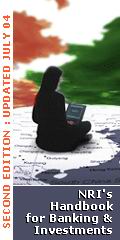|


|
Limited Direct Impact on Asia-Pacific Banks from Subprime Exposure
Singapore: The Singaporean banks have been the most transparent in Asia:
*Development Bank of Singapore (DBS) has disclosed US$850 million of CDO/collateralised loan obligation (CLO) exposures including those with ABS exposure of US$188m. This latter amount - not all of which is subprime-related and is rated A or above - amounts to about 1.5% of DBS Group's equity.
*Overseas-Chinese Banking Corporation (OCBC) has disclosed US$430m of CDO holdings, all rated investment grade, including US$181m with ABS exposure. This latter figure is about 2% of OCBC's group equity.
*United Overseas Bank's (UOB's) figures are USD260m and US$60m, i.e. 0.5% of its equity.
The overall CDO exposure of the Singaporean banks of around US$1.5 bln could potentially give rise to losses that would dent annual earnings but would not materially weaken the banks' capital.
Thailand: Siam Commercial Bank (SCB) and Kasikornbank (KBank) reported no exposures to CDOs, while Bangkok Bank (BBL), Krung Thai Bank (KTB) and Bank of Ayudhya (BAY) reported some exposure, mostly to higher rated tranches ('A' and above). The level of exposure ranges up to 6% of equity so that a loss on the portfolio could impact annual earnings but should not threaten solvency. BankThai has more substantial CDO investments including THB1.7bn of US subprime-related (21% of equity) against which it has already taken a THB0.3bn write-down.
Taiwan: According to FSC data, 16 Taiwanese banks have CDO exposures totaling TWD40bn i.e. about USD1.3bn. We do not have full details on their subprime exposures but even the total figure is just over 2% of the banks' aggregate equity. Mega ICBC Bank has the largest exposure of about TWD10bn (7% of equity).
Taiwan's Life insurers have been more active in pursuit of overseas investments due to their need for yield pickup to overcome their chronic negative spread issues. Nonetheless, data to date indicates a rather limited exposure to problematic subprime mortgage assets among life insurers, and most of the exposures are confined to highly rated portions in CDOs. In a worst-case scenario, losses related to subprime exposures are likely to be within 6% of equity even for the more aggressive investors among the life insurance companies.
Korea: Most Korean banks have very small exposures to CDOs with the exception of Woori which has total CDO and mortgage-backed securities (MBS) investments of KRW494bn (<5% of equity) including KRW147bn of subprime-related securities; however, the latter figure is only about 1% of the bank's equity. The exposures of other Korean banks are much lower and for most, the subprime exposure is negligible.
Hong Kong: Fitch's survey of most of the banks it covers in Hong Kong suggests negligible credit exposure to the US subprime mortgage crisis. No bank surveyed has direct credit exposure to US subprime mortgages through CDOs or asset backed paper. A number of these banks have reported small exposure to subprime securities through their investments in structured investment vehicles (SIV), although the SIV portfolios contain predominantly 'AAA' and 'AA' rated paper, and the banks do not expect any notable credit losses from their SIV portfolios. Among the local banks, Bank of East Asia has proportionately the largest holdings of CDOs (USD600m, i.e. 20% of equity) but states that these do not include any US subprime exposures.
China: Subprime-related losses may be material in dollar terms, but are not considered so when taken in relation to capital for most Chinese banks. The banks with the largest holdings of foreign securities are the Big 5 banks, among which only Bank of Communications thus far has provided any clarity regarding exposure, stating that it has no direct exposure to US mortgage-related securities, prime or subprime. Bank of China (BOC), Industrial & Commercial Bank of China (ICBC), and China Construction Bank (CCB) have stated that they will disclose exposure amounts during their release of interim financials this week and next. Of these three, BOC, with its more than USD130bn in foreign currency securities (as of end'06), is expected to be most exposed and its management has already admitted that millions of dollars of losses are anticipated. However, for a bank with an equity capital of USD54bn, the overall impact should be small.
CCB and ICBC, with total foreign currency securities holdings of USD42bn and USD28bn at end'06, respectively, are also likely to have some exposure, but strengthened earnings and the recent substantial capital raising by both banks should provide ample cushion to absorb any losses. The final of the Big 5 banks, Agricultural Bank of China (ABC), has stated that it does hold subprime-related MBS and CDOs, but has not publicly disclosed the exact amount. ABC's thin profits and equity base provide less cushion to absorb subprime losses, though at this point such losses appear relatively small.
China Merchants Bank, Shenzhen Development Bank, and Bank of Shanghai have stated they have no direct exposure to US subprime, but other smaller banks have revealed very little information regarding their portfolios. On the whole, the holdings of foreign securities at these banks are quite small, and any potential losses arising from subprime exposures are expected to be manageable.
Philippines: The Philippine central bank has stated that Philippine banks in aggregate hold USD180m of CDOs (about 2% of system equity), and Rizal Commercial Banking Corp (RCBC) has disclosed that it holds USD60m (16% of equity). However, we understand that all are backed by corporate debt and not by mortgages.
Malaysia: Maybank, Public Bank, CIMB, Hong Leong Bank, RHB and AmBank have reported no direct exposures and believe any indirect exposures to be very small.
Indonesia: The banks report no significant exposures. A few have small investments in commercial paper issued by ABCP conduits through their New York branches but the amounts are small at 0.2% of assets.
India: Indian banks have not disclosed details of subprime related investments. A few Indian banks with international activities may have some exposures but we would not expect these to be material relative to their capital, given that Indian banks have experienced strong demand for mortgage finance in their domestic market. Therefore they have not had to look overseas for investment opportunities, in contrast to financial institutions in Japan, Taiwan, Singapore and Hong Kong where weak economic conditions led them to look overseas for more attractive investment opportunities.
<<< Go back to Page 1
(This is press release of Fitch Ratings)
RELATED ARTICLES
Special section on Sub Prime ...Click here
Bank rating downgrades unnecessary on wide scale ...Click here
US Federal Reserve cuts discount lending rate ...Click here
Moody's on sub prime exposures of US banks ...Click here
S&P report on today's credit market risks ...Click here
CLICK FOR MORE FEATURES & STORIES
|
|


|